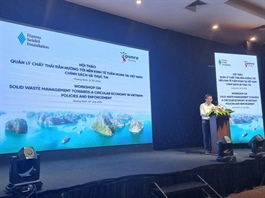Thai Nguyen gives firm backing for SME development
Thai Nguyen gives firm backing for SME development
Small- and medium-sized enterprises in the northern province of Thai Nguyen are being given efficient support to enhance self-reliance and develop sustainably.

Latest figures from Thai Nguyen Statistics Office show that in the first half of this year, nearly 420 enterprises were given business registration certificates with capital value surpassing $160 million.
The number of new business setups in Thai Nguyen in the past three years had exceeded 2,900 units, surpassing the set target of having over 800 units coming into being annually.
Thai Nguyen is currently home to nearly 11,000 businesses, with about 97 per cent of whom are small- and medium-sized enterprises (SMEs).
In the past couple of years, the province has taken drastic measures to ensure efficient enforcement of government policies and mechanisms, helping SMEs to bolster competitiveness, enhance self-reliance, and grow into a motivating force of the local economy.
Over the past two years, Thai Nguyen Department of Information and Communications (DIC) has convened four workshops presenting solutions to promote digital transformation at enterprises, co-operatives, and business households; and tailored 47 training courses, providing skills on using and exploiting digital platforms through online and in-person meetings for over 1,700 enterprises, trading households, and co-operatives.
DIC also supported nearly 550 enterprises, co-operatives, and trading households on using diverse digital platforms such as the unified business management platform, SME accounting software, e-invoices, digital signatures, restaurant management, and store management services, involving more than 4,100 installations. The training courses and training programmes are all free of charge to businesses.
Do Xuan Hoa, director of DIC, noted that the department has coordinated with the Young Business Association and the local association of SMEs to conduct a project to assess the level of digital transformation at enterprises, which is the basis to support the promotion of digital transformation.
“The department had also organised two dialogue conferences with business associations to directly answer questions as well as garner feedback from the business community to be able to remove difficulties in a timely manner and propel business development,” Hoa said.
Thai Nguyen Department of Tax has successfully deployed e-invoices for all enterprises in the area. The province has also expanded credit guarantees, created stronger conditions for businesses to access capital sources, and innovated lending processes to minimise procedures and shorten disbursement time.
According to Vu Ha, deputy head of the Business Registration Division under Thai Nguyen Department of Planning and Investment, the province has made efforts to shorten the time for returning business registration results from three to two days, for investment policy approval results from 35 to 25 days, and procedures for granting investment registration certificates from 15 to 10 days.
“We have also implemented many measures to support new business setups, and receive and process documents from enterprises applying a one-stop shop model. These fundamental innovations have created great convenience for businesses operating in Thai Nguyen,” Ha said.
Nguyen Van Thoi, chairman of the Thai Nguyen Business Association, noted that while the global and local economy still faces issues, Thai Nguyen’s socioeconomic development has achieved many inspiring results. This is by dint of concerted efforts by the province’s management at all levels, in parallel to the efforts by businesses themselves.
“The province’s synchronous solutions have been and are being implemented to help businesses in Thai Nguyen, including SMEs, have further refinements for sustainable development in both quantity and quality, contributing to the overall development of the province, striving to soon making Thai Nguyen a modern-oriented industrial and economic centre of the Hanoi region and the whole country,” said Thoi.
In early 2021, an SME support plan was approved in the province, with the core function to boost business competitiveness towards 2025, laying the foundation for efficient implementation of programmes to support business development.
The scheme focused on implementing measures that encompassed support in digital transformation, administrative reform and market entry; accounting and taxes; credit access and raising capital usage efficiency; information and consultancy; human resource development; and transforming trading households into SMEs, among others.
Relevant authorised agencies have regularly reviewed administrative procedures to be able to present suitable recommendations towards simplification, along with pushing up online public services provision to help firms save on time and costs.























